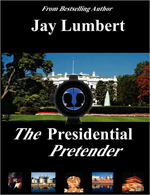When I sat down to write The Presidential Pretender, my goal was to write a great book, not just a good one.
A good book makes a reader want to stay up all night, turning pages with increasing speed to reach the end.
A great book drives one forward in the same compelling manner, but it can do more. A great book can make a reader think. It might change the reader in some small way. A great book can sharpen one’s perception of the world, and alter the prism through which reality enters the brain. A great book can linger like a hint of perfume. It can live beneath the surface of one’s consciousness and surface from time to time as we go through life.
As I have endured various obstacles in my life, I have thought of Santiago in The Old Man and The Sea. As I’ve watched my children grow, I’ve thought of Holden Caulfield in The Catcher in the Rye, or Shakespeare’s Romeo and Juliet. As I have watched Washington’s assault on small business, I’ve remembered John Galt in Atlas Shrugged. I have seen successful businessmen give in and quit, and not been surprised. I’d been warned in a book.
I have no illusion that The Presidential Pretender will stand beside these exceptional works as one of the all-time greats. But I do think that it may help its readers better understand the subtle complexities of our complicated world.
A great book takes on great subjects. I chose terrorism, patriotism and the protective mechanisms of the human mind.
Terrorism poses an enormous threat to our way of life. With 9/11 we saw the physical and emotional toll that terrorism can create. The devastation of 9/11 is nothing when compared to the destruction that would be caused by any sort of nuclear event.
Make no mistake — there are terrorists who would like nothing more than to see a mushroom cloud rising over the skies of New York or Washington. Our government employs thousands and spends billions to prevent this from happening.
Strangely, terrorism lies in the eyes of the beholder. A U.S. soldier is a dutiful child, a selfless patriot, a fun-loving parent and a faithful spouse in our country. To our “enemy,” this same soldier is a killer, an invader and a heathen — a terrorist. A man we see as a terrorist might be a loving father, a pious, God-fearing believer and a doting husband in his own country. What is the difference between them?
Terrorists are not born, they are created. Babies begin life with the same blank slate. Some grow up to model Mother Theresa, while others model Osama Bin Laden.
We are shaped by our experiences, and perceive good and evil in very different ways. This odd dichotomy creates the perfect setting for an extraordinary novel.
While our greatest threat appears to be radical Islam, terrorists can come in all shapes and sizes.
What happens if a young girl of twelve comes home from school find her parents murdered? What if she is told that “the Americans” have killed the Russian-born physicists who came to America for a better life? What if she is told that the American Government is a fault for their deaths? What if the only people who will keep her safe by day are men who demand something sinister from the child at night? Night after night.
What happens if this innocent victim vows to fight back? Is she still good, or is she evil? At what point would this become a justified “war,” where the gloves come off and morality is checked at the door? In war, patriotism and righteous acts by one side are viewed as criminal and insane by the other. What is the truth?
In The Presidential Pretender, I explore this richly complex subject, and relate it to the very real threats that we, as a nation, face today. This book is a complex, non-stop thriller. It is about psychological and physical war. It is also a story about redemption.
The Presidential Pretender tests the limits of the human psyche. It ponders how far a man or woman might go in their righteous fight for a cause, without sacrificing all that makes them good. It also leads the reader on an emotional roller coaster, from hate to love, from fear to joy and back. Does righteous retribution against an enemy justify extreme action? Does war make things right? Can there be forgiveness and redemption? The reader must choose. And I hope that they think of this book as they follow the current events of our day.
